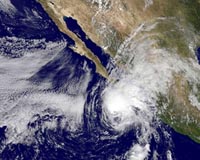| . |  |
. |
Boulder CO (SPX) Oct 22, 2009 Seismologists have found a new way to piece together the history of hurricanes in the North Atlantic - by looking back through records of the planet's seismic noise. It's an entirely new way to tap into the rich trove of seismic records, and the strategy might help establish a link between global warming and the frequency or intensity of hurricanes. "Looking for something like hurricane records in seismology doesn't occur to anybody," said Carl Ebeling, of Northwestern University in Evanston. "It's a strange and wondrous combination." The research is attempting to address a long-standing debate about whether the warming of sea-surface waters as a result of climate change is producing more frequent or more powerful hurricanes in the North Atlantic. It's a tough question to answer. Before satellite observations began in the 1960s, weather monitoring was spotty. Ships, planes, and land-based monitoring stations probably missed some hurricanes, which tend to last for about a week or so, Ebeling said. This type of uncertainty poses a problem for scientists, who can't identify trends until they know what the actual numbers were. To fill in the historical blanks, Ebeling and colleague Seth Stein are looking to seismic noise, an ever-present background signal that bathes the surface of the Earth. Seismic noise derives its energy from the atmosphere and then gets transmitted through the oceans into the solid earth, where it travels as waves. Seismometers record the noise as very low-amplitude wiggle patterns with much larger, obvious signals that come from earthquakes. Subtle changes in seismic noise frequency and amplitude have long been ignored. Ebeling and Stein analyzed digital seismograms dating back to the early 90s from two monitoring stations: one in Harvard, Mass., and one in San Juan, Puerto Rico. For this study, the researchers looked at seismograms recorded during known hurricanes in an attempt to see whether patterns produced during hurricanes look predictably different from patterns produced during regular storms or when there are no storms at all. Their preliminary results suggest that hurricanes do indeed produce recognizable patterns, and the waves generated by hurricanes travel large distances. The Harvard station recorded signals from Hurricane Andrew more than a thousand kilometers away. "There's definitely something there that shows this can be workable," Ebeling said. "This is something new and interesting." At least one major hurdle remains before scientists will be able to pull together a complete hurricane history out of the seismic records. For most of the 20th century, seismograms recorded data on rolls of paper. Those records, which contain hundreds of thousands of hours of data, will need to be digitized. Ebeling is looking for an efficient way to do that. Share This Article With Planet Earth
Related Links The Geological Society of America Bringing Order To A World Of Disasters When the Earth Quakes A world of storm and tempest
 Tropical storm Rick threatens flash floods in Mexico
Tropical storm Rick threatens flash floods in MexicoMexico City (AFP) Oct 21, 2009 Tropical storm Rick made landfall Wednesday in northwestern Mexico having lost its punch as a former top-strength hurricane, but still threatened the region with heavy rain and flash floods, US forecasters said. Rick's eye hit Mexico's northwestern Pacific coast at 7:00 am (1400 GMT), some 15 miles (25 kilometers) north of the port of Mazatlan, said the Miami-based US National Hurricane ... read more |
|
| The content herein, unless otherwise known to be public domain, are Copyright 1995-2009 - SpaceDaily. AFP and UPI Wire Stories are copyright Agence France-Presse and United Press International. ESA Portal Reports are copyright European Space Agency. All NASA sourced material is public domain. Additional copyrights may apply in whole or part to other bona fide parties. Advertising does not imply endorsement,agreement or approval of any opinions, statements or information provided by SpaceDaily on any Web page published or hosted by SpaceDaily. Privacy Statement |